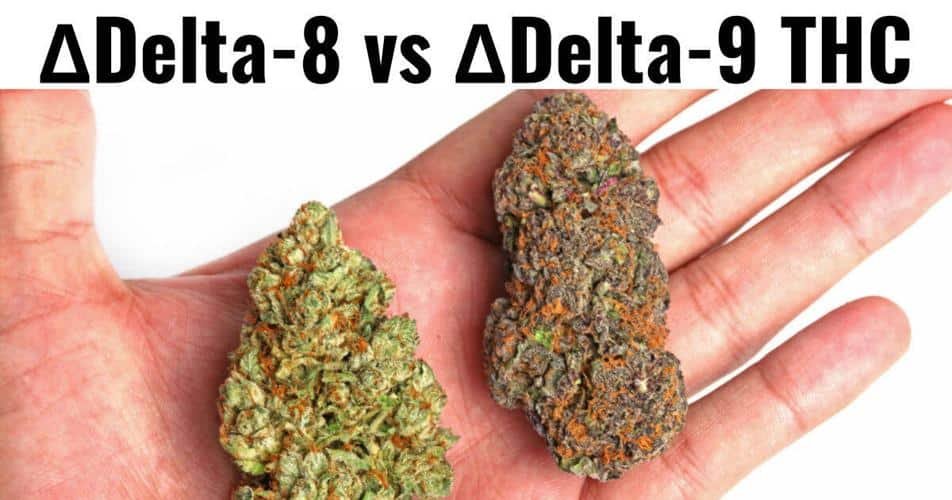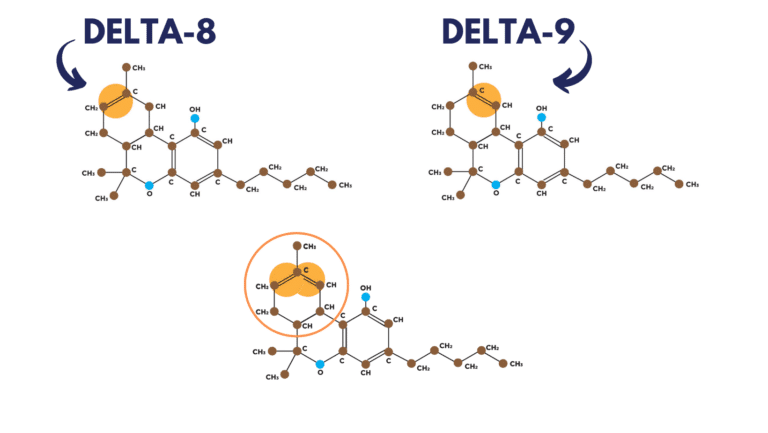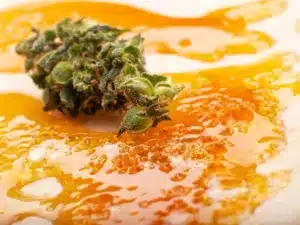With the increasing legalization of cannabis in the States, consumers can freely buy cannabis-based products from authorized dispensaries. In most of these states, you can purchase delta-9-tetrahydrocannabinol (delta-9 THC) products, which is the most potent variation of cannabis. Some states also allow the selling of Delta-8-tetrahydrocannabinol (delta-8 THC) products, which are less potent variations but with similar psychoactive effects.
Whether you are an enthusiast or a consumer, understanding delta-8 vs delta-9 becomes crucial. It helps consumers make informed decisions about which product best suits their needs and preferences. The difference between delta 8 and delta 9 is also essential for medical users as it can impact treatment efficacy and potential side effects.
In this article, we will explore the difference between delta 8 and delta 9, the regulations surrounding each compound, and making the choice based on benefits.
Sections
ToggleBackground on Cannabis Plants

The difference between delta 8 and delta 9 arises from the source material. Depending on the plants they originate from – hemp or cannabis, their THC content can vary. Both hemp and cannabis plants belong to the Cannabis sativa species, but they have some key distinctions:
Characteristic | Hemp | Cannabis |
THC Content | ≤0.3% | >0.3% |
CBD Content | High CBD with more natural profile | Variable CBD content |
Legal Status | Federally legal for medicinal use | Classified as a Schedule I Substance, but varies by state |
Primary Use | Industrial, CBD products | Recreational, medicinal |
Legally, hemp is defined as cannabis plants containing 0.3% or less THC by dry weight. This differentiation is essential to understand as it can put the legal status of the end product in question. Cannabis (often referred to as marijuana) contains higher levels of THC and is primarily grown for its psychoactive properties. The 2018 Farm Bill legalized hemp cultivation in the United States, increasing the availability of hemp-derived products. It is important to note that both plants can produce various cannabinoids, including Delta-8 and Delta-9 THC.
What is Delta-8 THC?
Understanding Delta-8 THC
Delta-8 THC is a naturally occurring cannabinoid found in both hemp and cannabis plants. However, it is found in minimal quantities. It’s structurally similar to Delta-9 THC, but it is a milder version of the latter, offering the same psychoactive effects at a lower intensity.
Chemical Structure and Synthesis
The chemical structure of delta-8 THC is almost identical to that of delta-9 THC, with the main difference being the location of a double bond. In the delta 8 molecule, this double carbon bond is on the 8th carbon chain, while in delta 9, it’s on the 9th. This slight variation accounts for the differences in their effects and potency.
Due to its low natural abundance, delta-8 THC is often synthesized from CBD or delta-9 THC through a process called isomerization. The process uses heat and catalysts to convert CBD into Delta-8 THC. However, this synthetic processing of CBD raises some concerns about the purity and safety of Delta-8 products.
What is Delta-9 THC?
Understanding Delta-9 THC
Delta-9 THC is the primary psychoactive compound found in cannabis plants. It is responsible for producing the entourage or “high” typically associated with marijuana use. The Delta-9 THC molecule interacts with the body’s endocannabinoid system, particularly the CB1 receptors in the brain, leading to various effects on mood, perception, and cognition.
Chemical Structure
As mentioned earlier, the chemical structure of Delta-9 THC varies from that of Delta-8 THC mainly due to the position of a double bond on the carbon chain. This slight structural variation results in Delta-9 THC having stronger psychoactive effects compared to Delta-8 THC.
Comparing Delta-8 and Delta-9 THC

Delta-8 vs Delta-9: Differences and Similarities
| Characteristic | Delta-8 THC | Delta-9 THC |
| Potency | Less potent due to minimal THC | More potent with higher THC content |
| Psychoactive Effects | Milder psychoactive effects | Stronger “high” entourage effect |
| Anxiety/Paranoia | Very less likely side effects | High potency makes such symptoms more likely |
| Legal Status | Gray area as it is not federal legalized, but some states legalize delta 8 THC | Mostly illegal but allowed for medical purpose |
| Natural Abundance | Very low | Abundant in nature |
| Origin | Hemp or cannabis | Primarily cannabis |
Effects on the Body and Mind
| Effect | Delta 8 | Delta 9 |
| Pain relief | Less effective due with less CB1 receptors inhibition | More effective due to stronger interaction with CB1 receptors |
| Anxiety | Potentially calming effects without the intense psychoactivity | Calming effects are accompanied with higher psychoactivity |
| Paranoia | Generally associated with a lower risk of these side effects | More likely to induce paranoia or anxiety in susceptible individuals, especially at higher doses |
| Cognitive function | Has less pronounced effects on these areas | Can significantly impair cognitive function and memory |
Consumption Methods and Safety
Both Delta-8 and Delta-9 THC can be consumed in several forms:
- Edibles: These compounds can be infused into gummies, chocolates, and other food products.
- Vapes: Vaporizing Delta-8 or Delta-9 THC oils for inhalation have higher psychoactive effects.
- Tinctures: Liquid extracts that can be taken sublingually or added to food and drinks.
- Flower: Smokable hemp or cannabis flower containing the respective compounds.
Safety considerations:
- Always start with low doses whether you use Delta-8 or Delta-9, but be careful, especially with Delta-9 THC
- There can be potential drug interactions, particularly with medications that affect the central nervous system
- Only buy Delta-8 or Delta-9 products from state-approved reputable sources that provide third-party lab testing results
Potential Benefits and Risks of Delta-8 and Delta-9 THC
Delta-8 THC benefits:
- Due to its low-intensity psychoactive nature, it has reduced anxiety compared to Delta-9 THC
- Offers potential pain relief and anti-inflammatory effects without the psychoactive risks
- Better for appetite stimulation with fewer side effects than Delta-9 THC
- Potential neuroprotective properties
Risks of Delta-8 THC:
- Limited research data is available on its long-term effects and safety
- Due to synthetic processing, delta 8 THC products can have inconsistent quality
- Potential for developing tolerance or dependence
Delta-9 THC benefits:
- Highly effective pain management for chronic conditions
- Chemotherapy patients can benefit from nausea and vomiting reduction effects
- Potential treatment for glaucoma
- Benefits for sleep disorders and PTSD
Risks of Delta-9 THC:
- Much higher risk of addiction and dependence
- High dosage can cause cognitive impairment and memory issues
- Increased anxiety or paranoia in some users
Legal Status of Delta-8 and Delta-9 THC
The legal status of delta 8 and delta 9 THC falls under the restrictions Schedule I Substances. Understanding Delta-8 vs Delta-9 legality is essential to navigate these compounds’ market, production, and usage.
- Delta-9 THC: Federally illegal in the United States when derived from cannabis. However, several states have legalized its use for recreational use.
- Delta-8 THC: Its legal status is a gray area. Federally, hemp is legal; however, under the revised DEA rules, all synthetically derived tetrahydrocannabinol are classified as Schedule I controlled substances. Some states have explicitly banned Delta-8 THC.
You must check local laws before using delta 8 THC or delta 9 THC products, as the legal landscape is rapidly changing.
Delta-8 THC in the Cannabis Industry
The popularity of delta-8 THC is making a niche in the cannabis industry as consumers are drawn to it as a “legal high.” Due to a legal alternative to Delta-9 THC in states where it remains prohibited, an influx of Delta-8 products is happening. Such products include:
- Vape cartridges and disposable vape pens
- Gummies and other edibles
- Tinctures and oils
- Infused beverages
- Smokable hemp flower sprayed with Delta-8 THC
However, market regulation is a challenging endeavour due to the inconsistent quality of delta-8 THC products. As research progresses and regulations evolve, the role of Delta-8 THC in the cannabis market may change significantly.
Choosing Between Delta-8 and Delta-9 THC
The selection between delta 8 and delta 9 THC products must be based on several factors, including:
- Desired Effects: If you’re seeking milder effects with less anxiety, delta 8 might be preferable. Delta 9 is more suitable for stronger pain relief or more intense psychoactive effects.
- Tolerance: Consumers with lower cannabis tolerance might find Delta-8 more manageable.
- Legal Status: Check your local laws to ensure compliance, as some states restrict entirely delta-8 THC while other allows it for medical application.
- Medical Conditions: Consult with a healthcare provider to determine which compound might be more beneficial for your specific needs.
Will Delta-8 THC Show Up on a Drug Test?
Lower intensity of delta-8 THC can give the impression to some people that it can be safer for consumption to pass drug tests as compared to delta-9 THC, but this doesn’t seem right. Both compounds are metabolized similarly in the body, and standard drug tests typically can’t distinguish between Delta-8 and Delta-9 THC. Delta-8 THC can result in a positive test for THC.
Conclusion
Delta 8 vs Delta 9 decisions can be challenging as both compounds offer potential benefits but also have risks and legal considerations. Delta-8 THC is a potentially milder alternative to Delta-9 THC, but understanding what’s the difference between Delta 8 and Delta 9 is essential for making informed decisions about cannabis use.




